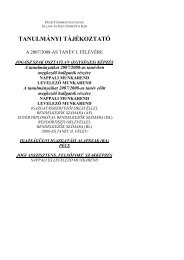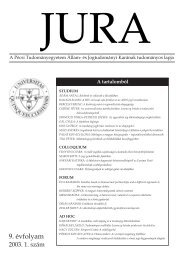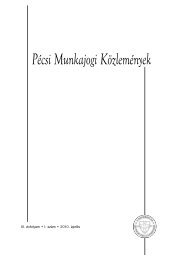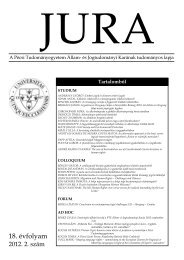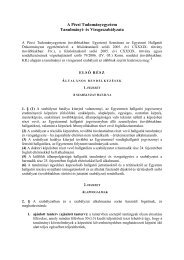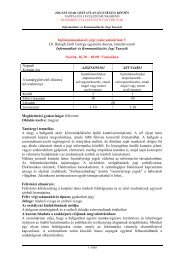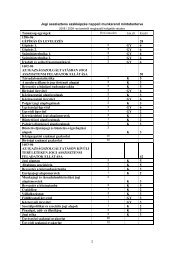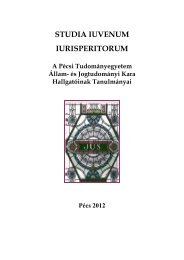2004. évi 2. szám - Jura - Pécsi Tudományegyetem
2004. évi 2. szám - Jura - Pécsi Tudományegyetem
2004. évi 2. szám - Jura - Pécsi Tudományegyetem
Create successful ePaper yourself
Turn your PDF publications into a flip-book with our unique Google optimized e-Paper software.
István Horváth: Light and shadow<br />
FORUM<br />
István Horváth<br />
head of the Legal Department of the Ministry of labour<br />
Light and shadow<br />
The successes and problems of<br />
Europe in the Hungarian labour law<br />
1. Apart from some absolute results, most of the different<br />
aspects of life can be said to be dual. Success<br />
has its price as well, and often it is failure that teaches<br />
us the most. The official subject for this article refers<br />
to the labour law challenges associated with the<br />
enlargement of the EU. Thinking about the message<br />
I have recognized the abovementioned duality and<br />
given the title „light and shadow” to my article. On<br />
one side of the coin is the light which symbolizes the<br />
successes of the European labour law legislation. On<br />
the other side is the shadow; the problems common<br />
throughout Europe on the level of the Member States<br />
and the Union.<br />
The directives of the EU determine the common<br />
but not uniform labour provisions, which have<br />
regard to the specialist needs and requirements of<br />
Member States. The twenty-five Member States are<br />
twenty-five different entities – besides their individual<br />
identities they have a separate legal system<br />
and separate historical traditions and social interests.<br />
The different levels of social dialogue and the<br />
variable incidences of collective agreements in each<br />
of the Member States results in a different intensity of<br />
the state’s role concerning labour law. The directives<br />
constitute the labour law expectations of the more<br />
developed – and probably luckier – part of Europe.<br />
The content of these directives eventually expresses<br />
the will of the Member States, as the decision-making<br />
mechanism of the EU does not act independently in<br />
this respect. All of these were not true till 1st May, to<br />
the nine other countries accessing to the EU together<br />
with Hungary. The participants from these new<br />
accession countries may confirm that the need to<br />
comply with the requirements of the EU has brought<br />
about absolute and inevitable external expectations<br />
of the accession in all of the ten countries.<br />
From the 1st of May the obligation to implemention<br />
of the directives is converted, and the accession<br />
countries will also be entitled to take part<br />
in the constitution of the directives as well. The first<br />
task is to teach – during the general revision of the<br />
working time directive – how, by which procedure<br />
151<br />
and through which partners to enforce our national<br />
interests. The preparation of the legislation has<br />
strengthened a new element, the lobbying among<br />
the experts of the EU Member States. Several times<br />
I have thought that the accelerated communication,<br />
the dumps of e-mails, provide several points<br />
of information but meanwhile the most important<br />
thing may disappear: the time which is necessary to<br />
produce adequate legislation.<br />
How heavy was the workload of legal harmonization?<br />
The answer is different for each Member<br />
State, due to the twenty-five different national<br />
characters. The last five years for the ten accessing<br />
countries have been a legal harmonizational derby,<br />
as act modifications meant the implementation of<br />
five or six directives apiece. The mentioned duality<br />
characterizes the legal harmonization concerning the<br />
enlargement of the EU. It is one experience to walk<br />
and another to run on a nice promenade. When we<br />
walk we have time to remember the beauty – when<br />
we run all we remember is the rush. A significant<br />
difference among the accessing countries and the<br />
existing Member States is that the latter countries<br />
implemented the directives in accordance with the<br />
tempo of the European legislation, but for the ten<br />
new Member States the process has been a kind of<br />
modernization. Their internal rules have only been<br />
tuned to the European wavelength for a short while.<br />
To double back to the abovementioned question<br />
let me relate a short story. In 2001, when Hungary<br />
had already adopted two-thirds of the labour law<br />
directives, Budapest Business Journal, an Englishlanguage<br />
newspaper, invited me to a conference. I<br />
was asked to rewiev the status of the legal harmonisation.<br />
The majority of the audience came from foreign<br />
countries but all of them worked in Hungary. I tried<br />
to be expressive. Probably you remember „God must<br />
be crazy”, the commercial in which a bottle of Coca-<br />
Cola fell out of the sky and thumped onto the head<br />
of a koissa. Well, concerning the legal harmonisation<br />
it is not about the distance between the koissa and<br />
the bottle of Coca Cola. Due to various historical<br />
reasons, a unified Labour Code regulated employment<br />
in the states of the Central-Eastern European<br />
region, as in several countries of South America. In<br />
our region obligatory historical reasons meant that<br />
the Soviet model was followed, although several<br />
rules were born which were a good standpoint to<br />
the legal harmonisation, even though they were part<br />
of a totally different political and economic regime.<br />
Hungary is a small state. In our internal relationship<br />
– in my opinion – the results and problems of<br />
the civilised societies may be found and modelled.<br />
The Hungarian legislation and the Hungarian em-<br />
JURA 2004/<strong>2.</strong>



